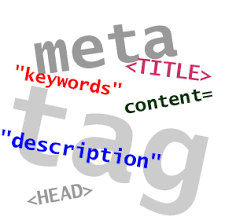Meta tags are something that you can never afford to overlook from the perspective of search engine optimization. You can avoid many mistakes by including these. Using meta tags is one of the surest methods to avoid 'spamming' the search. Following are the three most common and the most important meta tags that are used in SEO.

Meta Page Title Tag
The title tag is supported by all search engines and should be considered as the most important element in your optimization process. Why The page title is the first thing visible to search engine spiders as well as your human visitors. They can see your title at the top of the page in the browser and it is the title that becomes the all-important clickable link in the listings on the major search engine pages. These should as a result be accurate and concise, and should also include your important keywords. The title tag is usually an interesting, eye-catching headline with all important keywords used once.
Meta Description Tag
Most of the search engines support the meta description tag. Though it is somewhat less important than the Title Tag since the human visitor will not be able to see it, the description is often included in the search listings beneath the title tag and hence should be a correct and keyword-rich description of everything the page stands for. Google normally uses a gist of the webpage content; it will only use the meta description tag when it is not able to find sufficient page content to create a page description.
Meta Keywords Tag
This tag is very rarely useful mainly because it has been abused to the maximum. However, one cannot do without this tag either. It should be used very carefully and with a lot of judgment. Include your main keywords here. Repeating them and/or using related keywords 4 or 5 times is ideal. It is far better to include your keywords in the page content; that will be far more important in attracting the attention of the search engines.
A Brief History of Tags
Tags are generally used to classify content in a way that is useful for the reader and easy for search engines to understand, which potentially makes them incredibly important for both SEO and usability.
However, over the years, the way we use tags and their relative impact on rankings has changed. The key question is: are tags as important now as they once were?
Meta tags have lost their power in a big way on rankings over the past several years and, as a natural result, the number of websites using them has vastly diminished. We’re going to discard those as being dead in the water in terms of SEO benefits.
However, is the same true for title tags, header tags, and blog post tags–are they as important for SEO in 2016 as they once were?
Let’s take a look at each in order to answer that key question.
Title Tags
As you probably know, title tags are used by search engines (in part) to determine a page’s topic, and are also displayed in SERPs.
A good title tag will demonstrate what the user can expect from the page before they actually click. In this way, they are a strong determiner of click-through rates. But how do they affect your site’s SEO?

 Leslie
Leslie







